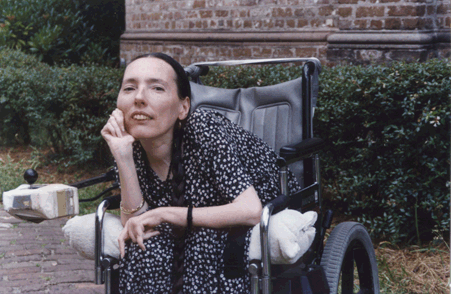
Five years ago today, on June 4, 2008, disability rights activist Harriet McBryde Johnson died unexpectedly at her home in South Carolina at age 50. With today’s 24/7 news cycle and a deluge of information each morning when we turn on our computers, is it easy to forget to stop and remember people no longer with us. Harriet McBryde Johnson is worth remembering.
McBryde Johnson made an enormous impact during a life that was too short, and her legacy continues in ways large and small. She didn’t live to finally see Jerry Lewis’ departure as hurtful spokesperson for the MDA, but she certainly had a hand in making it happen. And she was an early member of a loose affiliation of disability rights lawyer that has in the past five years grown into the vibrant Disability Rights Bar Association.
We also know with certainty that if she were alive today, Harriet would be on the forefront of fighting for United States ratification of the United Nations Convention on the Rights of Persons with Disabilities (CRPD). She’d be applauding the recent UN ruling that the CRPD required Talking ATMs in Hungary, and she’d be shaming Republic Senators here at home whose lies and right-wing politics blocked CRPD passage last December.
Most importantly, five years after her untimely death, McBryde Johnson’s activism and writings, her commitment to social justice, and her willingness to confront bigotry wherever she found it, serves as a continuing reminder of the core values and goals of today’s disability civil rights movement.
Below is the piece posted on LFLegal on June 4, 2008. You may also be interested in
- the New York Times Obituary of Harriet McBryde Johnson.
- a Simplified Summary of this Document, a feature of LFLegal.com designed to meet WCAG Success Criteria 3.1.5 (a WCAG 2.0 AAA Reading Level requirement).
Harriet McBryde Johnson (1957 – 2008) [originally posted June 4, 2008]
Harriet McBryde Johnson died at home in South Carolina on June 3, 2008. She was a beloved disability and human rights activist. The world has lost a passionate and dedicated advocate for social change. Untold numbers in the disability community and beyond have lost a caring friend and role model.
Lawyer, Writer, Advocate
Harriet McBryde Johnson was a civil rights lawyer, a weaver of tales, and a spokesperson for the dignity and humanity of people with disabilities. Her 2006 memoir, a 2007 teen novel, and numerous articles and essays for the New York Times, including a cover piece in the New York Times Sunday magazine, helped thrust Harriet onto the national stage. She was featured as New Mobility Magazine’s 2003 Person of the Year.
Johnson wrote passionately and with humor about a quite serious topic: her right and the rights of others, to exist in the world as a person with a disability. Her withering critique of those who would deny her existence was delivered with a calm and open-hearted voice. She had a warmth and generosity of spirit that was evident always.
On the quotation-finding website thinkexist.com, there is only one quote from Harriet, despite the abundance of her words of wisdom. She is quoted as saying “Death is natural and necessary, but not just. It is a random force of nature; survival is equally accidental. Each loss is an occasion to remember that survival is a gift.”
Through her activism, political commitment, and personal connections, Harriet left no doubt that her gift will be deeply missed.
I reviewed Johnson’s memoir in BeyondChron shortly after its publication. The book captured Harriet’s unique blend of humor, serious activism, and front-porch story telling, and it would be a fitting tribute for every activist to read this book. At the time, the memoir appeared to be aptly titled “Too Late to Die Young”. But despite a productive life on so many, many levels, it turns out the title was wrong. Harriet’s death at age 50 comes far too soon for a world that still desperately needs her.